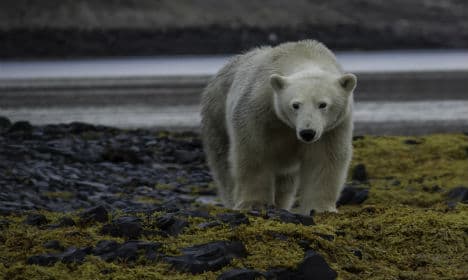Arctic site to aid studies amid climate change

If you are planning an expedition to the Arctic or are just interested in the area, you may want to check out new website ‘Isaaffik Arctic Gateway,' which is being launched in Copenhagen on Wednesday to facilitate research in the wake of climate change.
Denmark, Greenland and the Faroe Islands are launching the website Isaaffik Arctic Gateway, with the aim of creating a dynamic forum for everyone with work related to the Arctic area.
The name Isaaffik means “the big gate” in Greenlandic.
“Now it is also the name of the web portal, which is going to help all of us who are planning an expedition to the arctic areas. It is also going to function as a forum for the exchange of ideas and contributions to teaching, research and education,” the Danish Ministry of Higher Education and Science wrote in a press release.
An expedition to Greenland and the Arctic could sound tempting to many. But although the website will be a first step for those planning to go, it will not provide an open invitation for everyone fancying a trip. It will focus on research and not tourism, the ministry told The Local
“Everyone is able to visit the site and view the calendar and its activities. However, only registered researchers are able to see the contact info of the activities, just to avoid having the whole Internet applying for research expeditions,” a ministry spokesperson told The Local in a statement.
With the ice melting and the environment changing rapidly, the time is right to join forces when it comes to research and the Arctic, the ministry said.
“The Arctic environment is changing a lot these years and there is a need for substantially more research into how we can best handle these upheavals. With this website, it will become easier to exchange our knowledge and strengthen our collaboration across the Danish Realm, so that we together can start fighting the climate changes,” Danish Minister of Higher Education and Science, Sofie Carsten Nielsen said in a press release.
A Commonwealth of Realm project
Universities and research institutions across Denmark, Greenland and the Faroe Islands as well as the Danish Army have pulled together all information available about Greenland and have collaborated in setting up the new website, according to the ministry. It will be available on the website.
The Danish Ministry of Higher Education and Science hopes the site will become “a dynamic tool for everyone working with the Arctic.”
Denmark, Greenland and the Faroe Islands constitute The Danish Realm or the Commonwealth of the Realm, also referred to as the Kingdom of Denmark.
The website was to be formally launched at a Copenhagen opening reception event on Wednesday afternoon.
Comments
See Also
Denmark, Greenland and the Faroe Islands are launching the website Isaaffik Arctic Gateway, with the aim of creating a dynamic forum for everyone with work related to the Arctic area.
The name Isaaffik means “the big gate” in Greenlandic.
“Now it is also the name of the web portal, which is going to help all of us who are planning an expedition to the arctic areas. It is also going to function as a forum for the exchange of ideas and contributions to teaching, research and education,” the Danish Ministry of Higher Education and Science wrote in a press release.
An expedition to Greenland and the Arctic could sound tempting to many. But although the website will be a first step for those planning to go, it will not provide an open invitation for everyone fancying a trip. It will focus on research and not tourism, the ministry told The Local
“Everyone is able to visit the site and view the calendar and its activities. However, only registered researchers are able to see the contact info of the activities, just to avoid having the whole Internet applying for research expeditions,” a ministry spokesperson told The Local in a statement.
With the ice melting and the environment changing rapidly, the time is right to join forces when it comes to research and the Arctic, the ministry said.
“The Arctic environment is changing a lot these years and there is a need for substantially more research into how we can best handle these upheavals. With this website, it will become easier to exchange our knowledge and strengthen our collaboration across the Danish Realm, so that we together can start fighting the climate changes,” Danish Minister of Higher Education and Science, Sofie Carsten Nielsen said in a press release.
A Commonwealth of Realm project
Universities and research institutions across Denmark, Greenland and the Faroe Islands as well as the Danish Army have pulled together all information available about Greenland and have collaborated in setting up the new website, according to the ministry. It will be available on the website.
The Danish Ministry of Higher Education and Science hopes the site will become “a dynamic tool for everyone working with the Arctic.”
Denmark, Greenland and the Faroe Islands constitute The Danish Realm or the Commonwealth of the Realm, also referred to as the Kingdom of Denmark.
The website was to be formally launched at a Copenhagen opening reception event on Wednesday afternoon.
Join the conversation in our comments section below. Share your own views and experience and if you have a question or suggestion for our journalists then email us at [email protected].
Please keep comments civil, constructive and on topic – and make sure to read our terms of use before getting involved.
Please log in here to leave a comment.